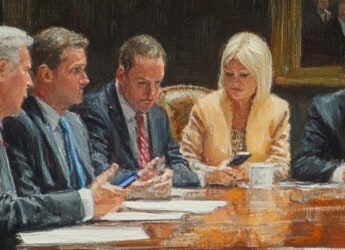|
|
Content Assessment: Navigating International Discovery Restrictions - Seven Recommendations
Information - 95%
Insight - 95%
Relevance - 93%
Objectivity - 93%
Authority - 96%
94%
Excellent
A short percentage-based assessment of the qualitative benefit of the post highlighting a recent article by David Moncure, Christopher Wall, Noah Miller, and Ashish Prasad on recommendations for navigating international discovery restrictions.
Editor’s Note: From time to time, ComplexDiscovery highlights publicly available or privately purchasable announcements, content updates, and research from cyber, data, and legal discovery providers, research organizations, and ComplexDiscovery community members. While ComplexDiscovery regularly highlights this information, it does not assume any responsibility for content assertions.
To submit recommendations for consideration and inclusion in ComplexDiscovery’s cyber, data, and legal discovery-centric service, product, or research announcements, contact us today.
Background Note: International discovery exercises and investigations can be a complex and challenging process for cybersecurity, information governance, and eDiscovery professionals. Navigating the different laws and regulations of foreign jurisdictions can be difficult, particularly regarding issues such as blocking statutes, labor law, privilege, and confidentiality. However, with proper preparation and research, and the support of experienced local counsel, these challenges can be overcome and international discovery restrictions can be successfully navigated.
Industry Expert Article*
Navigating International Discovery Restrictions: Seven Recommendations
By David Moncure, Christopher Wall, Noah Miller, and Ashish Prasad
Cross-border discovery exercises can often prove daunting for counsel, particularly where foreign legal procedures or requirements differ greatly from established U.S. discovery practices. Extensive planning, research and preparation are often required.
International discovery experts, including members of the Sedona Conference, have suggested a number of procedural practices that counsel should consider in order to maximize the effectiveness of their investigations or other discovery efforts abroad. This article will illustrate some of the key challenges an organization might encounter in conducting a discovery exercise outside the United States, while also providing seven recommendations focused on procedural practices and approaches to ensure success in navigating international discovery restrictions.
How the Aérospatiale Case Provides Some Leeway with Blocking Statutes
In response to broad American discovery requirements, many countries have enacted blocking statutes. While they vary in their scope and enforcement, all blocking statutes have the underlying goal of protecting the sovereignty of the state and its citizens from foreign litigation by preventing foreign nationals’ acquiescence to U.S. discovery requests.[1]
Foreign nationals often cite a blocking statute in order to avoid complying with a U.S. discovery request or to avoid sanctions for failing to comply.[2] However, there is some wiggle room. Blocking statutes do not always excuse foreign nationals from having to comply with a U.S. discovery order, and these laws often have limited effect helping foreign nationals avoid producing documents.
In Société Nationale Industrielle Aérospatiale v. U.S. District Court for the Southern District of Iowa (“Aérospatiale”), the Supreme Court addressed blocking statutes, holding that they “do not deprive an American court of the power to order a party subject to its jurisdiction to produce evidence even though the act of production may violate that statute,” and laid out a balancing test for courts to use in determining whether to order cross-border discovery.[3] (The factors in this balancing test are also codified in the Restatement (Third) of Foreign Relations Law).[4]
The court ruled that the Hague Convention dictated the procedures that must be followed for pre-trial discovery, and emphasized that a ruling that the convention did not apply to the discovery demands would hurt both domestic and foreign litigants. Regarding the blocking statute, however, the court noted that it was “well settled that such statutes do not deprive an American court of the power to order a party subject to its jurisdiction to produce evidence even though the act of production may violate that statute.”[5]
RECOMMENDATION: Thoroughly consider the implications of foreign data protection legislation.
This especially includes how the European Union’s General Data Protection Regulation (GDPR) affects the discovery process. Transfer of data outside the EU in connection with a discovery exercise is subject to the implementation of one of the appropriate safeguards defined in Article 46 of the GDPR, including standard data protection clauses, binding corporate rules, or the Privacy Shield framework.[6] Counsel must also ensure that any data collected and processed in connection with a discovery exercise in the EU is adequate, relevant and strictly limited to what is necessary, and that sufficient protections are in place for the security and accuracy of personal data processed for discovery.[7]
RECOMMENDATION: Take care to comply with foreign discovery and privacy practices and procedures.
This sounds obvious, but it can’t be stressed enough, since compliance can go a long way towards minimizing conflicts related to the discovery process, and also reduces costs. As the Sedona Conference has advised, “[p]reservation, disclosure, and discovery of Protected Data should be limited in scope to that which is relevant and necessary to support any party’s claim or defense in order to minimize conflicts of law and impact on the Data Subject.”[8] Central to this approach is a party’s restraint. A steadfast approach, using reasonableness and good faith and comity with foreign law wherever possible,[9] will help the investigation progress in an efficient manner.[10]
RECOMMENDATION: Consider whether the discovery requests are reasonable.
The reasonableness of a discovery request should be evaluated in light of “the degree of specificity of the request, and the availability of alternative means of securing the information” before a U.S. court will decide whether international law should be ignored or tolerated.[11] Aérospatiale’s advocated approach, similar to that seen above, also includes a set of standards for courts to judge the reasonableness of the measures parties are taking to compel discovery and approach investigations.[12]
Navigating Foreign Labor Laws and Interviewing Witnesses
Foreign labor laws present another major pitfall for investigating counsel seeking to interview witnesses outside the United States in compliance with foreign labor laws.
RECOMMENDATION: Take great care to research, understand, and comply with foreign labor laws when interviewing witnesses abroad.
Investigating counsel will generally choose to retain local counsel in the foreign jurisdiction to help assure compliance with the local labor laws.[13] Normally in the United States, a company would be well within its rights to require that all employees fully comply with the requirements of an investigation or litigation, threatening dismissal for failure to comply.[14] As noted by observers, such an order would be a direct violation of the labor regulations of some countries.[15]
For example, employees in a number of jurisdictions are permitted to remain silent through litigation and investigations and are well within their rights to ignore an order from an employer compelling disclosure, despite the threat of possible termination.[16] In some jurisdictions, this right to remain silent during an investigative interview is “roughly analogous to the American Fifth Amendment in the police-investigation context.”[17]
RECOMMENDATION: Foreign labor laws may also require outside intervention and involvement before interviews can actually take place.
In various countries, local unions and works councils need to be formally consulted before an internal interview process can even begin.[18] In some jurisdictions, it may be a violation of labor laws to require that the person being interviewed appear alone.[19] For instance, in countries such as England, the subject of the interview may have a statutory right to be accompanied by someone while the interview is being conducted.[20]
Mass warnings to employees or subjects of investigations, while routine in many kinds of litigation in the United States, may be inappropriate or illegal in other countries.[21] In addition, many countries have an established requirement that those conducting investigations inform employees or subjects of investigations of what their rights are in the given investigation, in their entirety.[22] A number of countries also require that employers disclose what documents mention the subject of the interview and, in some cases, offer to “correct” them even while the investigation is ongoing.[23] This process includes the interviewee’s ability to request the ability to “rectify errors” in the digital record with the permission of a governing body or court, essentially allowing the target of an investigation to edit data even while litigation is ongoing.[24] Some European countries forbid employers from unilaterally imposing mandatory reporting rules that might require the disclosure of information about other employees of the same company.[25]
RECOMMENDATION: Lawyers conducting interviews should in most cases immediately and clearly detail the relationship they have with the employee witness.
This clarification is normally referred to as an Upjohn warning, and it should be a common practice by interviewers regardless of where the interview is being conducted or who is being interviewed.[26] This warning is a fundamental part of the ethical requirements a lawyer faces when representing a company and interviewing employees of the company. The warning explains to the interviewee to whom the interviewing lawyer owes an obligation, clarifying that the interviewee is not the client of the questioning lawyer but is rather an employee of the lawyer’s true client, the company.[27]
While the particular means of conveying this information can take several forms, suggested elements and disclosures of the warning often include:
. . . [that] the attorney represents the corporation and not the individual employee; the interview is covered by the attorney-client privilege, which belongs to and is controlled by the corporation, not the individual employee; the corporation may decide, in its sole discretion, whether to waive the privilege and disclose information from the interview to third parties, including the government.[28]
It is important to recognize that, while Upjohn is a feature of domestic American law, it is not authoritative in foreign tribunals.[29] It is a good practice to provide Upjohn warnings when interviewing witnesses outside the United States for purposes of an international investigation.[30]
Thoughtfully Consider the Application of Attorney-Client Privilege
A variety of attorney-client privilege issues arise in connection with discovery exercises and investigations outside the United States. An initial question that arises is which nation’s legal privilege protections will be operative when an investigation is under way? American privilege rules differ in many meaningful ways from those of other countries, particularly when it comes to how far privilege extends.
As a general rule, most courts in the United States will usually apply the privilege rules of the jurisdiction in which the relationship was initially entered into.[31] The burden of proving the country of the relationship’s origin usually falls to the party asserting privilege.[32]
RECOMMENDATION: Corporations and their outside lawyers that commonly operate on the international stage should take great care in how and where they enter into their initial attorney-client relationships.
A thorough understanding of the privilege requirements, both in the United States and in the country in which the interview is to occur, must be developed before any discovery activity takes place.[33] To illustrate, while communications between general counsel and local counsel made in order to properly plan an investigatory interview in the United States would most likely be privileged, no such privilege may exist in a foreign country.[34] In such a scenario, even United States courts have upheld foreign restrictions on privilege designations, holding that communications with non-U.S. in-house counsel did not enjoy privilege with attorneys helping to conduct the investigations.[35]
In other instances, numerous foreign legal systems simply do not recognize privilege between an in-house legal counselor and his or her client, the corporation. These systems argue that the internal nature of in-house counsel removes the attorney’s capacity to provide independent legal advice, erasing the professional separation needed to distinguish between the counselor and the client.[36]
On the other hand, in China, for example, non-licensed legal advisors can establish privilege with a client, which is different than in the United States.[37] These stark differences highlight the counsel’s need to have a complete understanding of local privilege laws before approaching the discovery process itself.
Preparation and Research Are Fundamental to Maximizing Discovery Goals
International discovery exercises and investigations can raise unique challenges and pose numerous problems for counsel. Proper preparation and appropriate research into the requirements of the foreign jurisdiction relating to blocking statutes, labor law, privilege and confidentiality—especially with the support of experienced local counsel—can lay the necessary groundwork for counsel to effectively and efficiently navigate international discovery restrictions.
End Notes
[1] Edmund M. O’Toole & David N. Cinotti, E-Discovery in Cross-Border Litigation: Taking International Comity Seriously, The Int’l Disp. Resol. News, Fall 2010, at 26, available at https://www.venable.com/files/Publication/
cef1756a-0e27-4dfc-ad92-01f9870d59d2/Presentation/PublicationAttachment/6cb1677d-054d-4c71-bff3-08f7809bdb8d/IDR_News_Fall-2010.pdf.
[2] “How to Conduct International Discovery,” 71 Am. Jur. Trials 1 (Originally published in 1999) § 43 (Sept. 2022 update).
[3] Société Nationale Industrielle Aéreospatiale v. U.S. Dist. Court for the S. Dist. of Iowa, 482 U.S. 522, 544 n.29 (1987).
[4] Restatement (Third) of Foreign Relations Law § 442(1)(c) (1987).
[5] Aéreospatiale, 482 U.S. at 544 n.29.
[6] Regulation (EU) 2016/679, of the European Parliament and the Council of 27 April 2016 on the Protection of Natural Persons with Regard to the Processing of Personal Data and on the Free Movement of Such Data, and Repealing Directive 95/46/EC (General Data Protection Regulation), art. 46, 2016 O.J. (L 119) 62 – Transfers subject to appropriate safeguards [hereinafter GDPR].
[7] GDPR, art. 48, O.J. (L 119), 64– Transfers or disclosures of not authorized by Union law;see also Working Document of Article 29 Data Protection Working Party on Pre-trial Discovery for Cross Border Civil Litigation, 8–14 (Feb. 11, 2009), https://ec.europa.eu/justice/article-29/documentation/opinion-recommendation/files/2009/wp158_en.pdf.
[8] The Sedona Conference International Principles on Discovery, Disclosure & Data Protection in Civil Litigation (Transitional Edition) (Jan. 2017), 1.
[9] Tripp Haston & Lindsey Boney, A New Approach to Cross-Border Discovery: The Sedona Conference’s International Principles, 79 Def. Couns. J. 228, 232–33, Apr. 2012, available at https://www.jdsupra.com/legalnews/a-new-approach-to-cross-border-discovery-04822/.
[10] See id.
[11] Haston, supra note 9, at 233 (quoting Aérospatiale, 482 U.S. at 544, n.28).
[12] Id.
[13] Georgia L. Lucier, “Managing Litigation Across Borders,” Hunton Andrews Kurth (Oct. 12, 2013), available at https://www.andrewskurth.com/assets/pdf/article_1013.pdf.
[14] Donald C. Dowling, Jr., How to Conduct Internal Investigations Outside the United States, K&L Gates Multinational Employer Monthly, Apr. 2015, at 12.
[15] Id. at 12–13.
[16] Id. at 12; see also Erica M. Davila, International E- Discovery: Navigating the Maze, 8 U. Pitt. J. Tech. L. & Pol’y 5, 7, 10 (2008).
[17] Dowling, supra note 14, at 12.
[18] Id. at 13.
[19] Id.
[20] Id.
[21] Id. at 12–13.
[22] Id. at 13.
[23] Id. at 5, 13.
[24] Id.; see also BakerHostetler, “2015 International Compendium of Data Privacy Laws,” 87(2015), available at https://towerwall.com/wp-content/uploads/2016/02/International-Compendium-of-Data-Privacy-Laws.pdf (detailing Hungary’s data privacy laws and the “rectification” measures available to the target of an investigation).
[25] Dowling, supra note 14, at 13; Davila, supra note 16, at 7, 10.
[26] Upjohn v. U.S., 449 U.S. 383 (1981); Lucian E. Dervan, International White Collar Crime and the Globalization of Internal Investigations, 39 Fordham Urb. L.J. 361, 379–82 (2011); see also Sarah Helene Duggin, Internal Corporate Investigations: Legal Ethics, Professionalism and the Employee Interview, Colum. Bus. L. Rev. 859, 893–99 (2003).
[27] Dervan, supra note 26, at 379–82.
[28] Id. at 379–80.
[29] Dowling, supra note 14, at 14; see generally Dervan, supra note 26, at 379–82.
[30] Dowling, supra note 14, at 14.
[31] Richard M. Strassberg & Derek A. Cohen, Foreign Corrupt Practices Act Investigations: Challenges and Strategies for White Collar Attorneys and Their Clients, in International White Collar Enforcement (2015 ed.), 2015 WL 15893, at *5.
[32] Robert G. Morvillo & Robert J. Anello, Attorney-Client Privilege in International Investigations, 240 N.Y. L.J. 25, Aug. 5, 2008.
[33] Carlos F. Ortiz et al., 4 Key Issues When Conducting Cross-Border Investigations; From the Experts, Corp. Couns., Dec. 12, 2014.
[34] Id.
[35] Id.
[36] Morvillo, supra note 32.
[37] Strassberg, supra note 31, at *6.
International Discovery - Seven Recommendations - 020623
Cite: Moncure, D., Wall, C., Miller, N., & Prasad, A.. (2023, February 5). Navigating International Discovery Restrictions: Seven Recommendations. ComplexDiscovery. Retrieved from https://complexdiscovery.com/navigating-international-discovery-restrictions-seven-recommendations.
*Shared with permission of authors.
About the Authors
- David Moncure is Vice President and Associate General Counsel Information Lifecycle Governance at DaVita, Inc.
- Christopher Wall is Data Protection Officer and Special Counsel, Global Privacy and Forensics at HaystackID.
- Noah Miller is Deputy General Manager, Review Division at HaystackID.
- Ashish Prasad is Vice President and General Counsel at HaystackID.
Additional Reading
- Data Privacy Laws and Blocking Statutes: Five Practical Strategies
- Cooperation Standards in Government Investigations: Practical Tips
- Sales and Acquisitions in the Middle Market: Partnering Between Entrepreneurs and Private Investors
Source: ComplexDiscovery




























